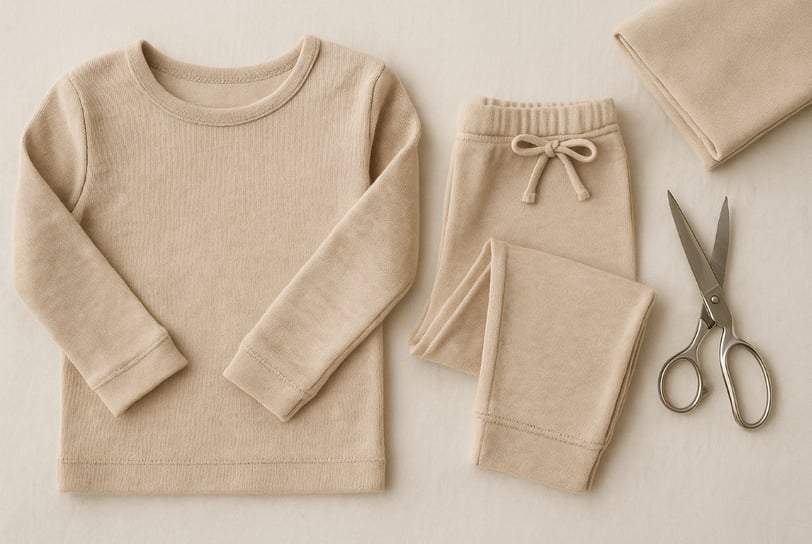Discover amazing discounts on sewing patterns-Fabric-Doll CLothes-eBooks-Yarn-& Other Handmades!
🧵 How to Sew Clothing for Sensitive Skin
Learn how to sew soft, skin-friendly clothing using gentle fabrics and smooth seams—perfect for sensitive skin and everyday comfort.
SEWING TIPS AND TECHNIQUES
7/10/20252 min read


Comfort Starts with What You Sew
If you've ever worn a shirt that felt itchy, stiff, or downright uncomfortable, imagine what that’s like for someone with truly sensitive skin. Whether it's due to eczema, allergies, or sensory sensitivity, the wrong fabric or seam can turn a perfectly good outfit into something unwearable.
The good news? You can sew clothing that feels better than store-bought. All it takes is the right fabric, the right construction, and a little extra care.
💡 Who Needs Clothing for Sensitive Skin?
Babies and toddlers (their skin is thinner and more absorbent)
Children or adults with eczema or contact dermatitis
Those with allergies to certain fibers or detergents
Anyone with sensory issues (including autism or ADHD)
Sewists who want comfort-focused clothes for lounging or sleeping
🧵 Best Fabrics for Sensitive Skin
Look for soft, breathable, natural fibers that don’t trap heat or irritate the skin:
Organic cotton – Unbleached, dye-free varieties are ideal
Bamboo rayon – Soft, moisture-wicking, and naturally hypoallergenic
Linen – A breathable natural fiber (pre-wash for softness)
TENCEL™ or Modal – Eco-friendly, silky-soft, and gentle on the skin
Silk or satin – Great for sleepwear, pillowcases, and linings
Cotton interlock or rib knit – Smooth, stretchy, and soft to the touch
🚫 Avoid: Polyester, nylon lace, scratchy wool, or heavily dyed synthetic fabrics.
✂️ Sewing Techniques That Matter
1. Use Flat Seams
Bulky seams can feel like sandpaper on sensitive skin. Instead:
Press seams open and topstitch them flat
Use a flatlock stitch if your machine has one
Consider French seams for a smooth inside finish (especially on woven fabric)
2. Skip Scratchy Tags
Add a printed or heat-transfer label—or skip labels entirely
If you sell or gift clothing, stitch labels into side seams or provide a removable tag
3. Soft Thread & Needle Choices
Use cotton or soft polyester thread, not stiff or metallic types
A ballpoint needle is best for knits—it glides through fabric without snags
4. Minimize Exposed Elastic
Cover elastic with a fabric casing
Or use soft fold-over elastic (great for waistbands, necklines, and underwear)
5. Choose Gentle Closures
Use plastic snaps, hook-and-loop tape, or soft knit ties
Avoid metal zippers or scratchy hook-and-eye closures near the skin
🧺 Washing Tips for Sensitive Wearers
Pre-wash all fabrics using fragrance-free, hypoallergenic detergent
Skip fabric softeners and dryer sheets—they can leave residue
Air-dry or tumble on low to preserve softness and shape
🧶 What to Sew: Sensitive-Skin Friendly Projects
Pajamas and sleepwear (use soft knits or bamboo)
Undergarments or base layers (use cotton/spandex blends)
Pillowcases (try silk, bamboo, or organic cotton)
Loose-fitting play clothes for kids with eczema
Headwraps, hats, and scarves from soft, natural fabric
Sewing for sensitive skin doesn’t require fancy tools or complicated patterns—it just takes care and thoughtful material choices. When you create clothing that feels good and looks good, you’re giving someone the comfort they need every single day.
So next time you sew, choose softness. Sew for comfort, sew with love.
✂️ Stay Connected
If you enjoyed this article, don’t forget to subscribe using the form in the footer so you never miss a new post, tutorial, or sewing idea.
And while you're here, be sure to check out my sewing shop—I offer sewing patterns, handmade items, and helpful tools that pair perfectly with the projects you see on the blog.
Thanks for stopping by and happy sewing!
Curated Sewing Goods Online – Based in the USA
Your source for sewing inspiration: patterns, fabrics, notions, sewing eBooks, and handmade goods
Reach Out COntact Me
rhonda@theneedlemarket.com
Proudly powered by Hostinger
Start your own site with Hostinger

